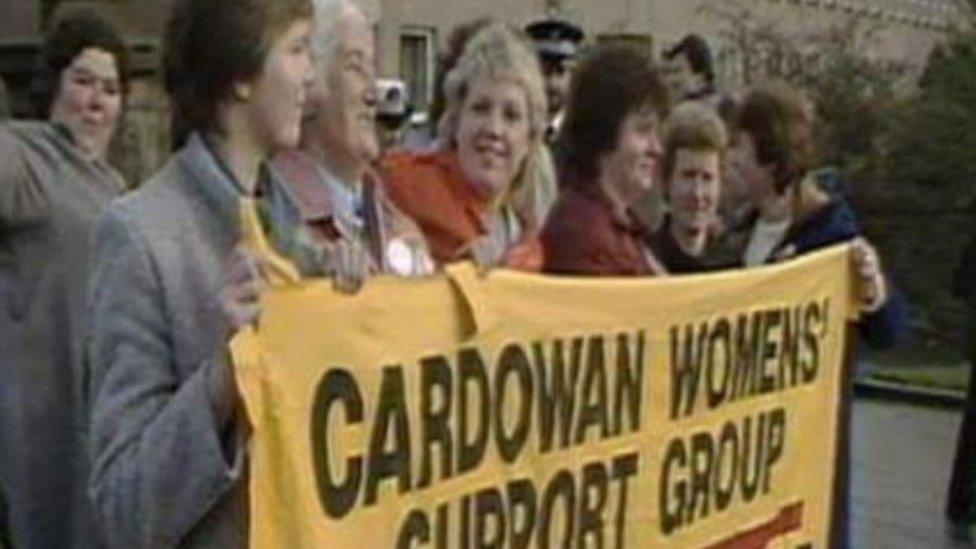Women and girls 'had to join the miners' strike cause'
- Published

Nicola's grandmother (second from left) joined demonstrations and pickets
The miners' strike left a lasting impact on communities across Scotland - including women whose loved ones downed tools from 1984-85.
Across the country, mothers, wives, daughters and sisters all joined the fight to save Britain's mines.
They took part in protests, opened soup kitchens and even became the breadwinners.
Forty-years on, two women shared their memories with BBC Scotland News.
The strike pitted thousands of miners and their trade union against then prime minister Margaret Thatcher and her Conservative government, which supported plans to shut 20 coal pits.
About three-quarters of the country's 187,000 miners went on strike to oppose the pit closures, which were expected to mean 20,000 job losses.
The miners' eventual defeat paved the way for a wave of pit closures and almost all of the UK's deep coal mines - where digging takes place underground - were shut within the next 20 years.

Nicola Regan was five when her father went on strike
At the time of the strike, Nicola Regan, from Moodiesburn, North Lanarkshire, was just five years old.
Her father Tommy Regan and uncle Hugh McCallum were miners, as was her grandfather before them.
Nicola told BBC Scotland News that she had "vivid" memories of the time, including a community soup kitchen set up by her parents in nearby Stepps.
She said: "The biggest memory I have is going along [to the soup kitchen] every day after school, and having my dinner there.
"I remember the camaraderie of the families getting together at a time of need.
"It was a happy time because you were in the soup kitchen, everyone was friendly and you developed more aunties you never knew you had."
Her mother, grandmother and auntie were all involved.
Nicola recalled: "I vividly remember going to rallies with my mum and dad, walking down the road chanting rhymes like 'coal not dole' and 'Maggie out'. The songs and chants are still in my mind."
She added her memories of the strikes were happy despite the hardships of the time as her parents hid the extent of the struggles they faced.
Nicola said: "As a five-year-old you really didn't know the hardship. You knew you were going to a soup kitchen for your dinner but you didn't realise your parents didn't have two pennies to rub together.
"You knew that people were fighting for their jobs, but you maybe didn't understand how tough it was."
"It wasn't until I was much older that I got that realisation of 'goodness, it really was difficult'."
She said the memories and passion she witnessed during that era-defining year had never left her.
Nicola said: "The sense of community amongst the miners that were involved in the strike is still present to this day.
"People will often stop me in the street and tell me stories about my dad.
"They always pick up the phone to me and ask me to come along to events as a miner's daughter. It's really lovely that you've still got that family feeling."

Nicola took her own daughter Lana-Jean to the picket line during last year's teacher strikes
Nicola has gone on strike twice in her own career - during the 2004 early years workers' strike and the 2023 teachers' strikes.
"I couldn't not do it because my morals told me my dad would come back and haunt me if I didn't," she added.
"The way I've been brought up, it's part of my heritage. I think the passion stems from those very early picket days."
Last year she took her 12-year-old daughter Lana-Jane along with her, just like her parents did 40 years ago.

Evelyn Morrison used to get up at 04:30 to join a picket line
Evelyn Morrison, 63, also from Moodiesburn, was 23 when her husband Charles went on strike.
He worked at the Bedlay Colliery in North Lanarkshire, as well as the Castlebridge Colliery and, later, a mine in Fife.
"You had to join the cause, you had to do what you could," she told BBC Scotland News.
"There was one miner who went back to work in the next village, and I used to get out of my bed at 04:30 in the morning and go over to picket close to his house before he went to work."
"I went and picketed in the morning, came back and went to bed and then my husband went out. You just had to work it between you."
Strike baby
Away from the picket line, Evelyn also faced challenges at home.
"When they went on strike I had a three-year-old boy and three months into the strike I became pregnant," she said.
The young mother continued to picket right up to and passed her due date but adds it did heighten stress and financial worries during the time.
As well as picketing, Evelyn helped in the local soup kitchen, making food parcels and distributing collection tins around Glasgow.
Her daughter, Claire, was born the day the miners went back to work in 1985 which she said makes her a "strike baby".
She added the strike brought the community of Moodiesburn together and created lifelong friendships.
Evelyn recalled: "Wives were all doing their own thing before the strike, bringing up their families but you got to know each other during it.
"I don't see them very often, because most of them have all moved on but on occasions like this weekend I'm going to the miners' club for a wee night and there will be a load of them there so we'll get a catch up."
The miners' strike eventually ended on 5 March 1985 but for those involved the memories will live on.